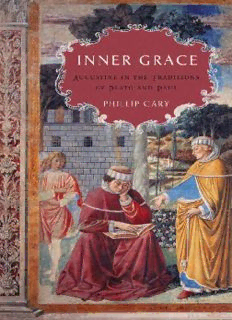
Inner Grace: Augustine in the Traditions of Plato and Paul PDF
Preview Inner Grace: Augustine in the Traditions of Plato and Paul
Inner Grace This page intentionally left blank Inner Grace Augustine in the Traditions of Plato and Paul phillip cary 1 2008 1 OxfordUniversityPress,Inc.,publishesworksthatfurther OxfordUniversity’sobjectiveofexcellence inresearch,scholarship,andeducation. Oxford NewYork Auckland CapeTown DaresSalaam HongKong Karachi KualaLumpur Madrid Melbourne MexicoCity Nairobi NewDelhi Shanghai Taipei Toronto Withofficesin Argentina Austria Brazil Chile CzechRepublic France Greece Guatemala Hungary Italy Japan Poland Portugal Singapore SouthKorea Switzerland Thailand Turkey Ukraine Vietnam Copyright#2008byOxfordUniversityPress,Inc. PublishedbyOxfordUniversityPress,Inc. 198MadisonAvenue,NewYork,NewYork10016 www.oup.com OxfordisaregisteredtrademarkofOxfordUniversityPress Allrightsreserved.Nopartofthispublicationmaybereproduced, storedinaretrievalsystem,ortransmitted,inanyformorbyanymeans, electronic,mechanical,photocopying,recording,orotherwise, withoutthepriorpermissionofOxfordUniversityPress. LibraryofCongressCataloging-in-PublicationData Cary,Phillip,1958– Innergrace:AugustineinthetraditionsofPlatoandPaul/PhillipCary. p.cm. Includesbibliographicalreferences. ISBN978-0-19-533648-1 1. Augustine,Saint,BishopofHippo. 2. Grace(Theology) 3. Bible.N.T.Epistles ofPaul—Theology. I. Title. BR65.A9C282008 230'.14092—dc22 2007028375 9 8 7 6 5 4 3 2 1 PrintedintheUnitedStatesofAmerica onacid-freepaper My thanks to Jack Doody and the community of scholars he has done so much to build This page intentionally left blank Preface Thisbookisthesecondinaseriesofthree,allofwhichconcernthe innerandtheouterinAugustine.Thefirst,Augustine’sInventionof theInnerSelf:TheLegacyofaChristianPlatonist,investigatestheorigins ofinwardnessorinteriority(andbytheway,Imakenodistinction between‘‘inner,’’‘‘inward,’’‘‘internal,’’and‘‘interior’’)andparticularly ofthenewanddistinctivelyAugustinianconceptofaprivateinner spaceoftheself,aninnerworldintowhichwemayentertolookfor whatishigherandmoredivinethanourselves.Inadditiontoitsin- terestforthehistoryofpsychology,theAugustinianconceptofinner selfisofgreatimportanceintheologybecauseitallowsustoconceive ofthedivineOtheraspresentwithintheself—acting,helping,speak- ing,andteachinginsideus.ThissetsthestageforAugustine’sreso- lutelyinwardconceptionofdivinegrace,whichisthetopicofthe presentbook. Theinwardnessofgraceinturnbringsintofocuswhatisat issueintheconceptofsacramentsasexternalmeansofgrace,whichis akeytopicofinvestigationinthethirdbookoftheseries,Outward Signs:ThePowerlessnessofExternalThingsinAugustine’sTheology.That bookwillfollowcloselyontheheelsofthisone,whichiswhyso manydetailedreferencestoitarefoundinthefootnoteshere.Itargues thatforAugustineneitherwordsnorsacramentscanconveytousa divinegiftorgrace,preciselybecausetheyareexternal.Augustinehas muchtosayabouthowexternalthingsmayserveassignsofwhatis inwardordivine,butincontrasttolatermedievaltheologianshedoes viii preface notthinksuchsignscanbeanefficaciousmeansofconferringwhattheysig- nify. Thereasonwhy parallels Augustine’sexplanationofwhywordscan sig- nifyandexpresswhatlieswithinthesoulbutcannotconveyorshowittoother persons.Forinfact(asAugustineargues,startlinglyandexplicitly,inhistrea- tiseOntheTeacher)wedonotlearnanythingfromwords.Thusbothwordsand sacraments are powerless to convey what they signify. This powerlessness is built into Augustine’s theory of signs, or semiotics, because it is a necessary consequenceofthewayheconceivestherelationbetweeninnerandouter.Un- derstanding this allows us to put disagreements between Catholics and Pro- testantsaboutwordandsacramentintoproperperspective.Thishasbeenthe goalofmywritingonAugustinefromthebeginning,whichiswhythelastvol- umecontainsthematerialsthatIworkedonfirst—almostfifteenyearsagonow. The concern of the present book is with the concept of grace itself, and what difference it makes that for Augustine grace is essentially inward. Whereas conceptsofgraceareaninevitablepartofChristianity,thenotionthatgraceis inner,akindofdivinehelpbestowedinwardlyonthesoul,isnot.Iarguehere that the inwardness of Augustine’s concept of grace, like Augustinian in- wardness in general, has to be understood against the background of his Platonism. This hasa wider significance beyond the ongoing scholarly inves- tigationofthenatureofAugustine’sdebtstoPlatonism,becauseAugustine’s Platonist inwardness is closely related to what is both lovely and problematic about his concept ofgrace. To understand this concept, I tell a story. As in my previous book, it is a story about the way Augustine’s thought develops through the course of his inquiries over manyyears, about how his concepts took shape as they helped himsolvephilosophicalandtheologicalproblemsbutalsoinevitablyledtonew problems,whichfurthershapedtheconceptshewasusing.(Sincethestoryis complex, involving many twists and turns and changes of mind, I have, as before,includedasummaryatthebeginningofeachchapter,andIhavealso includedintheappendixa‘‘BasicNarrative’’ofthedevelopmentofAugustine’s thoughtonthepsychologyofgraceintheanti-Pelagianwritings.)Tobringout thepointofthestory,itmighthelpifIsaysomethingaboutwhatImyselffind bothlovelyandproblematicinAugustine’sdoctrineofgrace.Differentreaders havedifferentproblemswithAugustineaswellasdifferententhusiasms,and my problems and enthusiasms may not be the same as yours. So letting you knowwhereIstandonafewtheologicalissuesupfrontoughttomaketherest of the book abit more accessible. First of all, I follow Augustine in the belief that grace never undermines freewill.Whatunderminesfreewillisnotgracebutsin,andbycombatingsin preface ix graceistheallyofeveryformofhumanfreedomworththename.Thisisone ofthemanylovelythingsabouttheAugustiniandoctrineofgrace:wecanpray forGodtochangeourwill,strengtheningitinallgoodness—andwhenweget what we pray for, that enhances our freedom rather than undermines it. It seemstomethisisjusthowChristianprayer,inoneofitsmanyforms,works. ChristiansareconstantlyaskingGodtochangeourhearts,toturnourwillin newdirections,togiveusnewdelightandcauseustoloveasweought.Praying this way and getting what we pray for is what I call, in chapter 4, the experi- ential matrix of Augustine’s doctrine of grace. People who pray like this will normally experience grace and free will as compatible with each other, as friends and collaborators rather than enemiesor competitors. But the compatibility of grace and free will goes yet deeper. For even Augustine’s doctrine of prevenient grace—the grace that comes before our prayersandmakesthempossible—reliesonakindofcompatibilismaboutthe relation of grace and free will, which in turn is founded on a fundamental conviction about the compatibility of divine and human action that is rather unfamiliar tomodern thought. To usethe termsthat ThomasAquinasmade standardinthetradition(termsusedalsobyProtestantsindocumentslikethe Westminster Confession) God’s activity as first cause does not undermine secondarycausessuchasourfreewill,butrathercreatesandestablishesthem. So if the Creator of our free will chooses that we shall freely choose X rather than Y, then that is what we do indeed freely choose. God’s sovereignty over our free wills does not undermine our free wills. Manypeoplefindthisideaprofoundlyobjectionable,butIdonot.Thatis something to reckon with as you read these pages. The notion that God can choosehowweshallfreelychooseseemstomeanecessaryconstituentinany sound Christian doctrine of divine power, and is accordingly shared by theo- logians as diverse as Augustine, Aquinas, Luther, and Calvin. The objections commonly raised against it today seem to me to rest on a characteristically modernfailuretounderstandthe distinctivenessofdivine causality,thinking of God’s power as if it were somehow in competition with ours—so that the unlimitedexerciseofdivinepowerwouldunderminetheexerciseofcreaturely power. I think this is fundamentally impossible: the activity of the Creator inherentlygivesbeingandpowertohiscreatures,asanovelistinherentlygives beingandpowertohercharacters—thedifferencebeing,ofcourse,thatwhen God creates characters they are real. What never has to happen is for God to limit his power in order to make room for his creatures to exert real power. Thisisnotazero-sumgame.Theexerciseofdivinepowercreatesandsustains allhumanpowers,andtheonlywayGodcouldhavelimitedtheexerciseofhis powerwithregardtouswouldhavebeenbychoosingnottogiveusexistence.
Description: